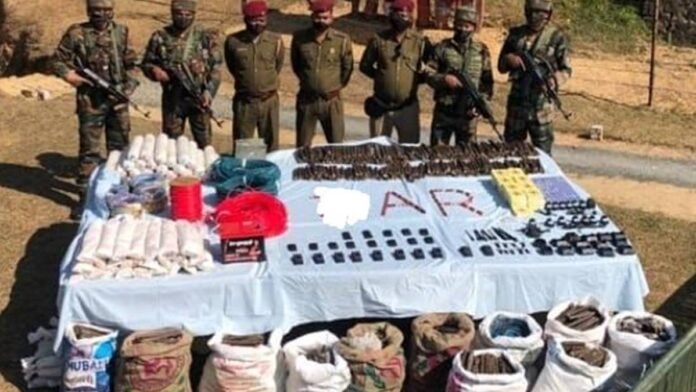Mizoram authorities recently seized a substantial cache of arms and ammunition near the India-Myanmar border. The operation, which resulted in the arrest of an individual, underscores the persistent efforts to combat illegal arms trafficking and maintain law and order in the region.
The seizure, which took place in the vicinity of the porous India-Myanmar border, is a stark reminder of the strategic importance of Mizoram in the context of transnational security threats. Situated in the northeastern part of India, Mizoram shares a long and porous border with Myanmar, making it susceptible to various illicit activities, including arms smuggling, drug trafficking, and insurgent movements.
The operation, conducted by security forces in collaboration with local law enforcement agencies, resulted in the confiscation of a significant quantity of arms and ammunition. Among the items seized were assault rifles, grenades, explosives, and other military-grade equipment, indicative of the sophisticated nature of the illicit arms trade operating along the border.
The successful operation is a testament to the vigilance and proactive measures undertaken by security forces to curb illegal activities and safeguard national security interests. It reflects a coordinated effort involving intelligence gathering, surveillance, and targeted interventions to disrupt criminal networks operating in the region.
The arrest of an individual in connection with the seizure further underscores the authorities’ determination to hold perpetrators accountable and dismantle illicit networks involved in arms trafficking. While the investigation is ongoing, the apprehension of suspects sends a clear message that illegal activities will not be tolerated, and those responsible will be brought to justice.
The seizure of arms and ammunition near the India-Myanmar border also highlights the complex security dynamics prevalent in Mizoram and the broader northeastern region of India. The porous nature of the border, coupled with rugged terrain and limited infrastructure, poses significant challenges for law enforcement agencies tasked with maintaining security and combating transnational threats.
Efforts to address these challenges require a multifaceted approach that encompasses enhanced border surveillance, intelligence sharing, capacity building, and cooperation with neighboring countries. Collaborative initiatives at the regional and international levels are crucial to effectively counter cross-border criminal activities and promote stability in the region.
The incident serves as a stark reminder of the need for sustained efforts to address the root causes of insecurity and conflict in Mizoram. Socio-economic development, inclusive governance, and community engagement are essential components of long-term strategies aimed at addressing underlying grievances and building resilience against extremist ideologies and criminal networks.
Furthermore, the seizure of arms and ammunition underscores the importance of addressing the nexus between illicit trade, insurgency, and organized crime in the region. Addressing the underlying drivers of conflict and instability requires a comprehensive approach that addresses socio-economic disparities, strengthens governance structures, and promotes inclusive dialogue and reconciliation.
In the wake of the seizure, there is an urgent need to bolster security measures along the India-Myanmar border and enhance coordination among various stakeholders, including security forces, intelligence agencies, local authorities, and communities residing in border areas. Strengthening border management mechanisms, enhancing surveillance capabilities, and investing in infrastructure development are key priorities in this regard.
As Mizoram grapples with the challenges posed by transnational security threats, it is imperative to adopt a holistic approach that combines robust law enforcement measures with efforts to address the root causes of instability. By fostering cooperation and coordination among stakeholders and investing in long-term solutions, Mizoram can effectively safeguard its borders, promote peace, and ensure the safety and security of its citizens.
In addition, the seizure of a significant cache of arms and ammunition near the India-Myanmar border highlights the persistent security challenges facing Mizoram and the broader northeastern region of India. The successful operation underscores the importance of proactive measures to combat illicit activities, enhance border security, and safeguard national interests. As Mizoram continues its efforts to address these challenges, sustained cooperation and collaboration among stakeholders will be essential to promote peace, stability, and prosperity in the region.


